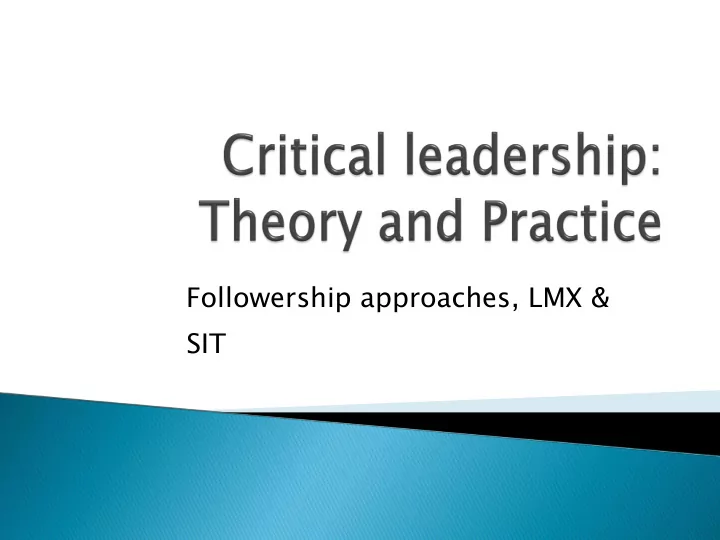

Followership approaches, LMX & SIT Stewart and Tymon 2016
More than 100 years of research Estimated $30billion annual spend on leadership development! Yet we are not happy with our leaders Traits, behaviours, styles, situational, transformational ◦ Appeals to perceptions of what leaders are or should be, “out front”, “leading the way” Stewart and Tymon 2018
◦ Leaders are those who can do extraordinary things ◦ But are they? Potential issue: leader-centric Stewart and Tymon 2016
Stewart and Tymon 2018
Stewart and Tymon 2016
Leaders have to claim and be granted leadership (De Rue and Ashford, 2010) Without followers there is no leader Leadership does not happen in a vacuum In a high-tech, globalised world with: ◦ Flatter, leaner organisations and ◦ Individuals with more expectations of participation Followers need more attention Stewart and Tymon 2018
◦ Leader Member Exchange (LMX) ◦ Social Identity Theory (SIT) ◦ Implicit Leadership Theories (ILTs) ◦ Romance of Leadership (RoL) Stewart and Tymon 2018
Critique of leader/ship measurement and Inconsistent results assessment instruments Stewart and Tymon 2018
Raises questions: Stewart and Tymon 2018
Jo 1 2 3 Sam Francis Alex Leaders treat followers differently based on the type of relationship they have with them Stewart and Tymon 2018
In-group followers and out-group followers exist ◦ Trusted assistants, mature relationships ◦ Hired hands, distant or transactional relationships Stewart and Tymon 2018
The question is why are followers in one group or the other? Leader makes an `offer` Follower accepts or rejects dependent on their needs Stewart and Tymon 2018
Or, follower makes an `offer` and leader accepts or declines Develops early in the relationship Remains relatively stable Based on social exchange theory Unique to each LMX DYAD Stewart and Tymon 2018
Not behaviour, not characteristics, not perception An interaction between leader and follower Leader and follower contribute to the LMX DYAD Graen & Uhl-Bien (1998) ◦ Both leader and follower contribute the same `currency` Dienesch & Liden (1986) Stewart and Tymon 2018
◦ Affect, respect, loyalty, perceived contribution Schyns, Paul, Mohr & Blank (2005) ◦ Respect (professional) is key Dansereau, Graen, & Haga (1975) ◦ Leaders and followers contribute different currencies ◦ All relationships are totally independent from each other Berneth et al. (2007) ◦ Exchange is based on expectancy theory Good relationships have good results: Stewart and Tymon 2018
◦ Satisfaction ◦ Performance ◦ Commitment What will impact the quality of LMX? ◦ Turnover Stewart and Tymon 2018
Stewart and Tymon 2018
People want to belong to and identify with groups Our self image is developed through the groups we belong to People will have a stronger identity with some groups than others Social Identity affects group performance because it impacts on: ◦ Trust, Collaboration, Group norms ◦ Intra-group interactions ◦ Inter-group interactions
The groups we belong to determine how we react to people in our own groups and with others who are not (Tajfel & Turner, 1979) In groups have a bias ◦ In-groups are viewed as heterogeneous Out-groups are viewed as homogenous Out- group discrimination occurs Us and them! Stewart and Tymon 2018
Our self-concept and identity drive our behaviour and groups play a large part in developing these Leaders can increase these by:
A prototypical leader is more likely to achieve these things Prototypical leaders are more likley to be accepted by groups ◦ Being one of us, doing it for us, crafting a sense of us, making us matter
Prototypical leaders appear more attractive and influential and are therefore more effective Charismatic leadership is an attribution by group members rather than a competency `Leadership is in the eye of the follower` (Nye & Simonetta, 1996) Is there an argument to recruit and/or develop prototypical leaders?
To what extent should leaders develop prototypicality? Stewart and Tymon 2018 Othman, R., Ee, F. & Shi, N. (2009).
Understanding dysfunctional LMX: antecedents and outcomes. Leadership & Organizational Development Journal , 31 (4) 337-350 Schyns, B. & Day, D. (2009). Critique and review of LMX theory: Issues of agreement, consensus and excellence. European Journal
of Work and Organizational Psychology , 19 (1) 1-29 Stewart and Tymon 2018
Recommend
More recommend